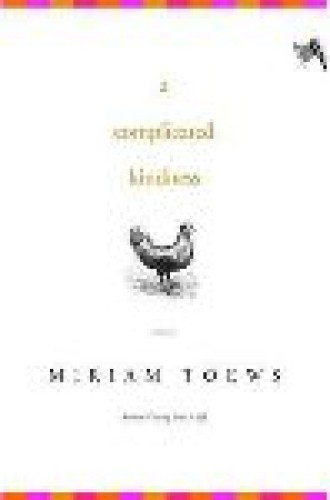A Complicated Kindness
Many novels have been written from the point of view of someone railing against an oppressive religious upbringing. Few, however, are as funny yet sympathetic as Miriam Toews’s outstanding third novel, which won last year’s Governor General’s Award in Canada. Toews beat out Alice Munro for the prize—no mean feat.
This coming-of-age story, told by 16-year-old Nomi Nickel, is set in the early 1980s in the rural Manitoba town of East Village, which is populated mostly by conservative Mennonites. Nomi lives with her father, a teacher at the local high school, who is slowly selling all his furniture and sits in the front yard on a yellow lawn chair, watching the highway.
Nomi’s mother, Trudie, left them three years earlier, after Nomi’s older sister, Tash, ran away. Both have been shunned by the Mennonite church, whose pastor, Trudie’s brother, Nomi calls The Mouth. Before leaving, Tash told her sister to “walk away,” but Nomi can’t because, she thinks to herself, “you’re one of the ones who did and there’s this old guy in a wool suit sitting in an empty house who has no one but me now thank you very, very, very much.”
Nomi is a female Holden Caulfield, and Toews gives her a similarly saucy, sardonic voice. The quirky little scenes resonate long afterward. Nomi stops to talk to a neighbor girl, who opens her green purse to reveal “a lipstick and a gun, a plastic one. You’re all set, I said. Then she asked me if I knew Jesus drank wine. I said no, and she said, see, nobody knows the bad side of Jesus.”
While the surrounding religious community worries about minor issues such as dress and drinking, Nomi must cope with a depressed father and little prospect of living past 40: “At forty, I’ll have worked for approximately twenty-three years [at a local factory] chopping heads off chickens.” Her hunger for life and her dark humor help her to cope.
She smokes Sweet Caps cigarettes and hangs out with her boyfriend, Travis, to whom she was first drawn when he “mentioned the name of Lou Reed without acting like a fawning dork about it.” Even a sheltered Mennonite, she writes, “knows not to stick her tongue into the mouth of a boy who owns an Air Supply record.”
Such humor is balanced by artful, moving passages, such as this: “I imagined Tash lying in her bed with her window open thinking hey, that’s Nomi on her French horn, the most beautiful instrument in the world when played properly. I tried to smoke a Sweet Cap afterwards but my lips were too numb to hold on properly so I just held it between my fingers and watched it burn away.”
Reading this book, you find yourself caught between laughter and tears. Nomi’s dispassionate voice, while at times sarcastic, disguises pain that many would find overwhelming. And Nomi’s relationship with her father is touching. They seem to understand each other, though they deal with their losses in different ways.
Toews, who grew up Mennonite in a small Manitoba town, lost her own father to suicide and wrote about it in a memoir, Swing Low: A Life. Her portrait of Nomi’s struggle is spot-on, yet she maintains sympathy for the people Nomi struggles to separate herself from.
A Complicated Kindness has upset some Mennonites. But when Nomi calls Mennonites “the most embarrassing sub-sect of people to belong to if you’re a teenager,” she does so as a teenager who is not that interested in the nuances of religion. She is interested in survival, and this book depicts her struggle with humor and pathos.






